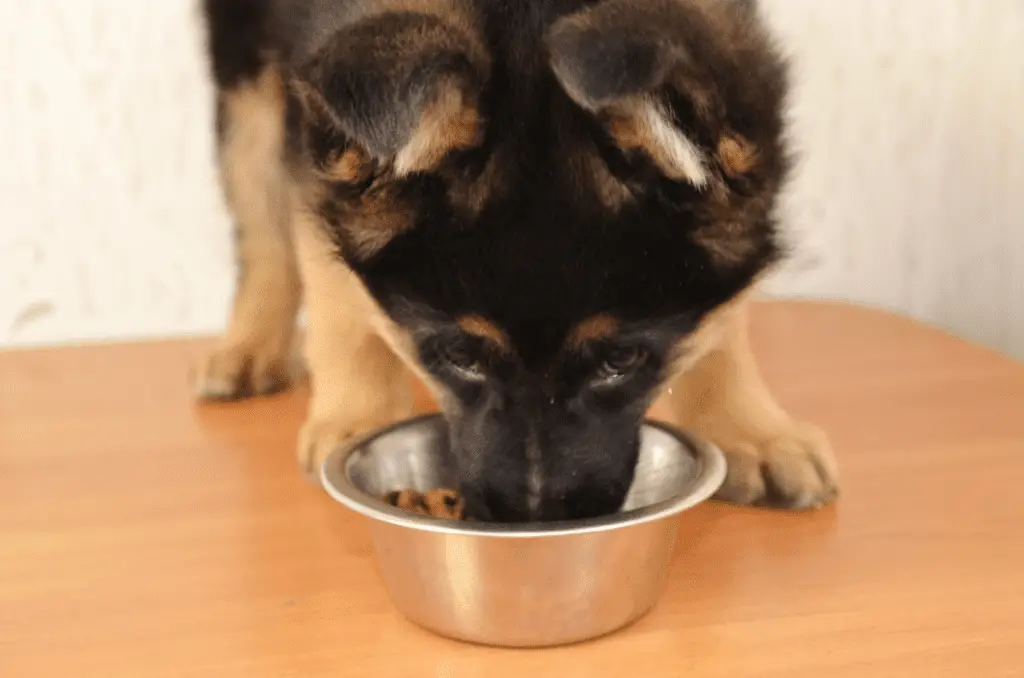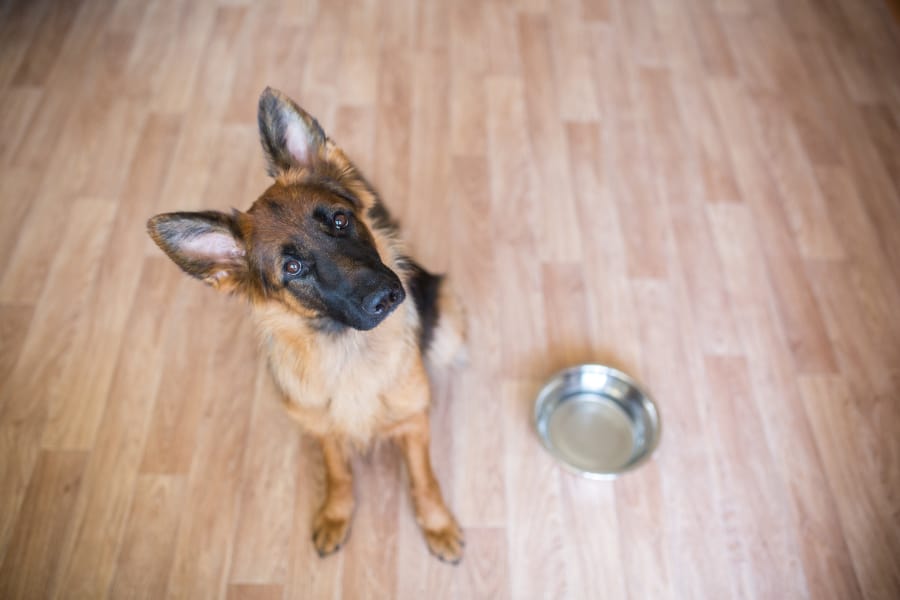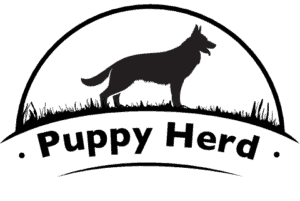When a German Shepherd loses interest in food, it’s a cause for concern. German Shepherds, like all dogs, need regular sustenance to thrive and remain healthy. There are many reasons why a German Shepherd may develop a lack of appetite or refuse food altogether, and some are more serious than others.
German Shepherds may stop eating due to medical issues such as viral, bacterial, or parasitic infections. Environmental factors could also play a role and cause stress, leading to food refusal. Additional reasons include behavioral problems, picky eating, and old age.
Worried about your German Shepherd’s inability or unwillingness to eat? Read on to learn more about why your dog may not be eating and what you can do about it.

German Shepherds And Canine Anorexia
Canine anorexia is the term for dogs that refuse to eat—it is a symptom, not a diagnosis. There are two types of canine anorexia including:
- Pseudo-anorexia – Your German Shepherd may show an interest in food and attempt to eat but cannot do so. He may struggle with chewing, may vomit, or have issues swallowing.
- True anorexia – Dogs with true anorexia show little to no interest in food.
Dogs of all breeds, including German Shepherds, may present with either form of canine anorexia. So, it’s vital that owners take their German Shepherd to a vet to rule out any minor or severe medical issues.
German Shepherd Medical Issues And Loss Of Appetite
A German Shepherd with little to no appetite is concerning. Some canine viruses may be treated at home, whereas others, like parvovirus, require immediate veterinary care. Always let a veterinarian rule out any medical issues before assuming your German Shepherd is just finicky.
Viral Infections In German Shepherds
While parvovirus is more common in puppies, it can wreak havoc on an unvaccinated adult German Shepherd. The virus causes numerous gastrointestinal symptoms, including loss of appetite and vomiting. If you suspect that your German Shepherd has contracted parvovirus, it’s critical that you seek emergency veterinary care. Over a quarter of dogs with parvovirus die.
Another less-concerning virus that often causes loss of appetite is kennel cough. It is common among dogs, including German Shepherds, who often socialize with other canines outside the home. Like parvovirus, kennel cough can be prevented with a vaccine.
Parasitic Infections In German Shepherds
German Shepherds infected with parasites may show several symptoms, including loss of appetite. The loss of appetite could be due to other symptoms common in parasitic infections, including abdominal pain, nausea, bloating, and fatigue.
It’s essential to have your German Shepherd dewormed as a puppy and as it grows to have the veterinarian perform regular fecal testing.
In addition, an adult German Shepherd should take regular flea, tick, and heartworm preventatives to reduce the likelihood of future parasitic infections.
Bacterial Infections
Most bacterial infections, including campylobacteriosis, are easily treated with antibiotics. Bacterial infections can cause loss of appetite, and the other symptoms could devastate a dog’s health. Diarrhea and vomiting can lead to potentially fatal dehydration. Puppies are more susceptible to bacterial infections.
Other Medical Issues
Pancreatic Enzyme Insufficiency is a form of malabsorption and a common condition among German Shepherds. It is a condition that causes the body to produce an insufficient number of digestive enzymes in the pancreas.
German Shepherds Dogs (GSDs) that present with Pancreatic Enzyme Insufficiency usually show signs of polyphagia, or excessive eating. However, some dogs may vomit and have anorexia.
This condition cannot be cured, but vets can treat it with prescribed digestive enzymes and a specific diet. In some cases, a dog may experience an overgrowth of bacteria, leading to the need for antibiotic therapy.
Other problems with the organs can lead to a loss of appetite in German Shepherds. These issues may be the result of other infections, congenital defects, or injury.

Environmental Factors That Cause Appetite Loss In GSDs
German Shepherd owners may not think to look at their dog’s environment as a possible cause of their dog’s loss of appetite. External factors can, in fact, cause a German Shepherd to lose interest in eating. By examining your dog’s surroundings, you may be able to locate the culprit and determine if something is causing them discomfort.
A New Environment
If your German Shepherd is new to your home, it might not yet feel comfortable in its new environment. Being separated from its previous owners, siblings, or other canine companions can cause a lot of stress. Stress manifests in strange ways and may cause appetite loss.
New dogs, especially adults, experience a period of adjustment when they’re brought into a new home. This is a critical time in your German Shepherd’s life that requires patience and understanding. Some dogs adjust better than others, but it’s still important to give the dog a safe space to decompress as they take in their new surroundings.
Loss Of Companion
German Shepherds are incredibly loyal to their people and other pets in the home. They develop powerful bonds and accept members of the family as their “pack.” So, when they suddenly stop coming around, it can put them under serious stress. German Shepherds are prone to separation anxiety, and it may present as a loss of appetite.
Change In The Dog’s Routine
German Shepherds are highly intelligent canines that do very well with a set routine and schedule. If your German Shepherd is used to morning walks, afternoon playtime, and regularly scheduled feedings, a change in that routine could confuse them.
It may take time for your German Shepherd to adjust to the new schedule. Even simple changes, such as a new feeding bowl or feeding your GSD in a different room, could cause them to eat less.
German Shepherd Behavioral Issues and Refusal To Eat
Teething
Around 12 weeks of age, a German Shepherd begins growing adult teeth. A GSD going through this phase is “teething,” which is marked by unwanted chewing behaviors. This chewing is usually to relieve the pain and discomfort associated with the eruption of adult teeth.
Unfortunately, if a German Shepherd is chewing on things he shouldn’t be—sticks, shoes, toys, etc.—it could lead to gastrointestinal discomfort or more serious issues, including bowel obstruction. Any gastrointestinal issue can cause a loss of appetite.
Make sure to offer your German Shepherd plenty of safe chew toys. German Shepherds are medium to large breed dogs, so keep their size in mind when purchasing chew toys to prevent choking, obstruction, or other digestive issues.
We recommend the PetsLA Puppy Teething Chew Toy from Amazon. These toys are available in different sizes, for dogs up to 88 pounds. There are different color options and the soft rubber and squeaky core help stimulate your GSD.
If your German Shepherd chews on random objects, and you suspect that they may have swallowed something, reach out to your vet immediately.
Finicky German Shepherds
Generally, German Shepherds are not considered fussy eaters. They’ll often eat what you serve, as long as you make it a regular routine.
Sometimes, however, a German Shepherd may develop picky eating behaviors, especially if it’s fed table scraps and treats throughout the day.
Alternatively, your GSD may simply not like the food you’re providing. Some dogs prefer wet, canned food, whereas others go crazy over dry kibble. Try offering different foods to see if your pet’s eating behaviors change.
When switching your dog to a new food, make sure that it’s done gradually to avoid additional digestive upset and unwanted symptoms, including diarrhea.
It’s not unheard of for a dog to be picky, but it’s always best to rule out other issues first.
Old Age May Cause A German Shepherd To Stop Eating
Viral, bacterial, and parasitic infections, along with other medical issues, can cause a German Shepherd to stop eating, but sometimes it just comes along with old age.
As dogs age, they may lose their appetite. This is normal as long as the dog is eating and not rapidly losing weight. Around this time, it might be appropriate to transition your German Shepherd to a senior diet. Remember that German Shepherds still need high protein, even in old age, to keep their muscles healthy.
Final Thoughts
Ensuring that your German Shepherd is happy and healthy is an integral part of being a responsible pet owner. If your GSD stops eating, have the dog examined by a veterinarian.
Once medical issues are ruled out, try reducing table scraps and treats, maintain a regular feeding schedule, offer different types of foods, experiment with creative feeding, or dress up your pet’s food with canned veggies.
If the symptoms persist, your veterinarian may recommend that you take your dog to a specialist.
